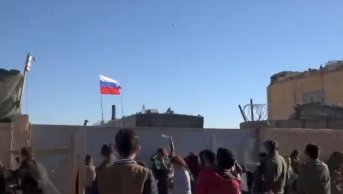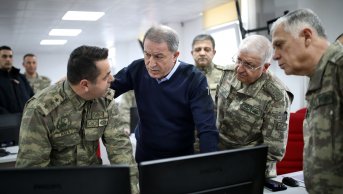PYD's Sphere of Influence Expanding in Syria

The People's Protection Units (YPG), a Kurdish militia based in Syria, has gained the upper hand over the al-Qaeda-linked Islamic State of Iraq and al-Sham (ISIS) in northern and northeastern Syria in recent weeks.
The YPG took control of the Yarubiya border crossing which leads to Mosul province in Iraq and the border town of Til Kocher, which is densely populated with Arabs, not long ago. The YPG is trying to advance towards largely Arab regions of strategic importance. There are settlements with a majority-Arab population in Tal Abyad, located between the Kurdish area in the northeast (Jazirah) and the Kurdish regions (Kobani and its environs) in the north. Taking the control of Tal Abyad is important for the Kurds because it connects Jazirah with Kobani geographically.
Saleh Muslim, leader of Syria's Democratic Union Party (PYD), and YPG spokesman Redur Khalil clearly state that the Kurds' next objective after seizing control of the Yarubiya border crossing is to take control of these settlements.
As a result of the latest operations, Khalil said, “They liberated 23 towns and villages from Til Temir to Serekaniye (Ras al-Ayn).” The ISIS-linked groups had to withdraw from Ar-Raqqah and Tal Abyad, where they had held influence. Khalil states their next targets as follows: “Tal Abyad is a Kurdish settlement and is a part of Rojava (Syrian Kurdistan). We see that Kurdish cities and towns have been under attack from radical armed groups. None of the communities in the area are content with the presence of those groups. There is no doubt that the YPG has plans to liberate those areas as well, and will act when the time comes.”
The towns of Azaz, Jerablus and neighboring settlements are situated between the western Kurdish sector, called Afrin and Kobani (Ayn al-Arab), which is located in Syria's central northern area. The majority of its population is Arab with some Turkmens and Kurds. As for the YPG's plans for this region, Khalil says: “We see Azaz and Jerablus as part of Rojava because they are located between Serekaniya, Kobani and Afrin. These are all included in the YPG's plans to avoid any difficulties in transportation.”
Hence, as indicated by these statements, the YPG wants to take control of the Arab and Turkmen-populated Kurdish area, which is divided into three regions, and form an integrated Kurdish region including almost the entire Turkish-Syrian border zone. However, the YPG's influence over the buffer zones in which Kurds are not in the majority is more difficult than in the Kurdish regions, where it has local support. At this point, cooperation between the YPG and Arab tribes, which are not comfortable ISIS's authority, might be brought forward. It is known that Arab tribes in Til Kocher and Yarubiya are not comfortable with ISIS, and these Arab tribes have a substantial role in the YPG's military success. The same cooperation might become apparent with other Arab and Turkmen settlements as well. The YPG's control of the regions in Ar-Raqqah and northern Aleppo might pose a risk for Kurds, as it might mobilize more Free Syrian Army (FSA)-affiliated groups against them.
The YPG is not only strengthening its position against ISIS, but also against other Syrian Kurdish parties, through its military achievements. The YPG is the only armed Syrian Kurdish force in the field, while the PYD's political power is inarguably increasing against the other Kurdish parties. The PYD does not want to share the advantages of its military success with other Kurdish political parties. This situation brings about political fractures between the parties. Thus, the Kurdish High Council, where representatives of the PYD and other parties within the Kurdish National Council (KNC) convene, loses its function. While the PYD argues that the Kurds should attend the Geneva II Peace Conference as a separate group, some parties within the KNC supported by Massoud Barzani agreed to attend the conference with the Syrian National Coalition. These fractures will deepen as the PYD/YPG continues to achieve success in the field.










